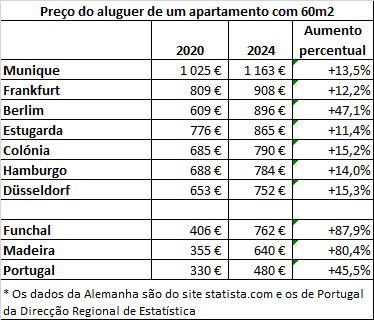The German television channel ZDF broadcast a report the day before yesterday that follows the journey of Nina and Heiko , two young people from that country who moved to Madeira after the Covid-19 pandemic. The program analyses how our island has become popular as a destination for digital nomads and describes the biggest challenges that arise in this process of change, with a special focus on housing costs. Jessica Szczakiel, the author of the documentary, chose to pose a question as the title of her work – “Glücklich auf der Insel?”, which can be translated as “Happy on the island?” This is because she concluded that only with a good salary is it possible to have a truly pleasant life in Madeira. “The cost of living and rents on the island have increased sharply and are almost as high as in Germany. Houses and apartments are now as unaffordable for many locals as they are for many newcomers”, we read in the introduction to the report. Is this really the case?
The ZDF report focuses heavily on housing costs, as this is the main expense for families. To compare the changes in rental prices in Germany’s largest cities with the regional reality from the pandemic period to last year, we used data from various sources, as reliable as possible – the Regional Statistical Office and the website Statista.com, which collects information from official and commercial reports. We chose to define an apartment of 60 square metres as the standard size and to take seven large German cities (Berlin, Cologne, Düsseldorf, Stuttgart, Frankfurt, Hamburg and Munich) as a reference.
Thus, in 2024, in Germany, the average rental price for an apartment with the aforementioned characteristics varied between 752 euros in Düsseldorf and 1,163 euros in Munich. In Madeira, the average rental price for the same property was around 640 euros. However, in Funchal, the average price rose to 762 euros per month, that is, higher than the city of Düsseldorf and very close to the averages in Hamburg (784 euros) and Cologne (790 euros). The average rental price for the same property in Portugal was 480 euros.

In the period between 2020 and 2024, the cost of rent in Funchal increased by around 88% (from 406 euros to 762 euros). Across Madeira as a whole, there was also a substantial increase – from 355 euros to 640 euros, which corresponds to an increase of 80%. In Portugal, the increase in rent was 45.5%.
In the seven German cities, the cost of rent increased as follows over the same period: Berlin +47%, Cologne and Düsseldorf +15%, Hamburg and Munich +14%, Frankfurt +12% and Stuttgart +11%.
When analysing this issue, it is also necessary to take into account the evolution of workers’ incomes in the two situations in question. The minimum wage in Germany went from 1,544 euros in 2020 to 1,985 euros in 2024, which represents an increase of 29 percent. In the same period of time, the minimum wage in Madeira went from 651 euros to 850 euros, which represents an increase of 31 percent. In other words, the increase in the minimum wage of a German was greater than the increase in the value of the average rents to be paid for an apartment in the main cities of their country (the only exception would be Berlin), but it does not cover the level of updating recorded in the rental market in Madeira.
Taking into account exclusively the evolution of average rents in the housing rental market and minimum wage levels, it is natural that there is a change in the perception that Germans have about the cost of living in the Region and, objectively, it is no longer so worthwhile for a citizen of that country to come and live in our archipelago.


